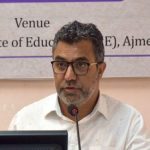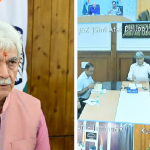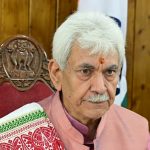Srinagar: Kashmir is witnessing a troubling rise in mental health challenges among children, with emotional distress, anxiety, and depression becoming increasingly common. This trend is highlighted in the 2022-2023 annual report by the Child Guidance and Wellbeing Centre (CG&WC) at the Institute of Mental Health and Neurosciences (IMHANS), Srinagar, which shows a significant uptick in mental health concerns among children aged 0 to 18 in the region.
The data reveals a stark age-wise distribution of new cases. The majority of new cases, 2,577, were found in the 7-14-year age group. This was followed by 1,929 cases in the 15-18-year age group and over 1,000 cases in the 0-6-year age group. Several factors contribute to this alarming rise, particularly family dynamics and socio-economic challenges.
Family-related issues, such as sibling rivalry (26.73%) and certain parenting styles (6.14%, especially authoritarian and neglectful approaches), are major contributors to children’s mental health struggles. Socio-economic difficulties, including low social status, ethnic and political tensions, and the loss of loved ones, account for 21.73% of these concerns. Additionally, academic stress—fueled by exam pressures and poor performance—affects 15.68% of children, while bullying, peer pressure, and corporal punishment contribute to 9.29%. Excessive gadget use is also linked to 12.77% of cases.
The gravity of the situation is further underscored by the National Crime Records Bureau (NCRB) report, released in December 2023, which revealed that Jammu and Kashmir had the highest number of attempted suicide cases in 2022. Of the 1,769 cases reported nationwide, 497 were from the Union Territory.
Experts are deeply concerned about this rising trend. Dr. Zaid Wani, a professor in the Department of Psychiatry at IMHANS, highlights the urgency of addressing this crisis. “The rise in mental health challenges among children is alarming and demands immediate attention,” he said. Dr. Wani emphasized the critical role of support from parents, teachers, and elder siblings. “It’s vital to create an environment where children feel supported, not judged,” he added.
Waseem Kakroo, Consultant Clinical Psychologist (RCI) at the Centre for Mental Health Services, emphasized the importance of early intervention. “When children exhibit signs of distress, timely action can prevent long-term consequences. Parents must prioritize open communication and avoid stigmatizing emotional struggles,” he said. “Children’s mental health is shaped by their immediate environment. Schools and families play a pivotal role in nurturing resilience and self-esteem,” he further added.
Dr Yasir Hassan Rather, a professor in the Department of Psychiatry at IMHANS, emphasized the impact of socio-economic stressors, such as poverty, political unrest, and family instability, on children’s mental health. “Chronic stress can compromise children’s coping mechanisms, leading to heightened anxiety, depression, and behavioral issues. We must address these root causes to prevent long-term psychological harm,” he said. He also pointed out that authoritarian and neglectful parenting styles often lead to emotional distress. “It’s critical for parents to adopt a balanced, authoritative approach—one that is nurturing yet sets clear boundaries. This fosters emotional stability and self-confidence in children,” he explained.
Dr. Muzzafar Ahmed, consultant clinical psychologist at Composite Regional Centre (CRC) Bemina, highlighted the often-overlooked impact of sibling rivalry. “Competition for attention, affection, or resources can lead to feelings of insecurity and inadequacy. Parents must intervene when necessary to promote healthy relationships between siblings and teach conflict resolution skills,” he said.
Prof. Dr. Reyaz Malik, a renowned pediatrician in the valley, raised concerns about the detrimental effects of excessive gadget use on children’s brain health. “Excessive screen time is becoming one of the leading contributors to developmental and behavioral issues in children. It interferes with critical brain functions such as attention, memory, and emotional regulation,” he said. “Children miss out on important face-to-face interactions and physical activities, which are essential for healthy brain development. Parents must set limits on screen time and encourage more engaging, creative play.”
In response to this growing crisis, several initiatives have been launched to offer support. IMHANS, in collaboration with the Directorate of School Education Kashmir (DSEK), is working to train teachers and families to address psychosocial issues and create nurturing environments. A key initiative involves integrating a positive discipline module into teacher training programs across ten districts, promoting mutual respect and constructive classroom management.
Additionally, targeted mental health programs have been introduced in two key educational zones—Amira Kadal and Baghi Dilawar. These programs provide teacher training, pilot projects to assess referral systems, and wellness centers offering counseling services with visiting clinical psychologists. School-based Mental Health and Psychosocial Support (MHPSS) programs are also being implemented to directly support students, while parent management and community outreach initiatives engage families in promoting mental well-being.
IMHANS has also developed a curriculum aimed at helping teachers better understand child mental health and equipping them with practical strategies to support students. Awareness campaigns are also reaching remote areas like Karnah and Gurez, ensuring that even the most isolated regions have access to essential support.
Syed Mujtaba, Coordinator at CGWC, highlighted the role of teachers in identifying and addressing psychosocial and mental health challenges through wellness clinics. He stated, “CGWC-IMHANS-K remains committed to advancing mental health awareness and education through capacity-building programs. Empowering teachers with the right tools and knowledge is essential for creating supportive environments that can significantly influence the well-being of children and adolescents.”
Interestingly, these efforts align with the National Education Policy (NEP) 2020, which emphasizes the importance of mental health services in schools. The policy advocates for the early identification of mental health issues and the timely provision of support to enhance students’ socio-emotional well-being alongside their academic growth.
In line with these efforts, the Minister for Health and Medical Education, Social Welfare, and Education, Sakeena Masood, inaugurated a daylong conference on Child Mental Health and Psychosocial Support at the Sher-e-Kashmir International Convention Centre (SKICC) on November 13. In her address, Masood emphasized the importance of addressing mental health challenges among children, stating, “Children are the future of our nation, and their mental well-being is crucial for shaping a positive society.” She also stressed the need for institutional interventions and creating environments that foster emotional development.








